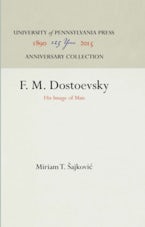"Dostoevsky is the unrivaled and perspicacious seer of the human mind and heart; he emerges as a great friend and teacher of humanity. He has dearly read the signs of our times, for he lived through the agonizing doubts and despairs of our present spiritual crisis. His sincerity, his spiritual heroism, and his moral courage have never been questioned. "
With these words, the author of the present work, Miriam T. Šajković, begins her initial attempt to acquaint American readers with Dostoevsky's philosophy of education. The views of Dostoevsky on educational problems in his own time have been historically explored by Šajković in relation to nineteenth-century Russia and the events which shaped its attitudes and customs. The author has studied the central aspects of Dostoevsky's system in order to extract from them a contribution toward the formulation of a philosophy of education suitable for the present time. Šajković proposes that a new synthesis of Dostoevsky's thought and contemporary American pedagogy be effected for the purpose of reinstating serious reflection upon modern morals and religion.
The book contains an annotated bibliography, conveniently divided into sections according to various high school reading levels; selections from his letters, arranged under topic headings; a chronological table of his works; and a master bibliography of primary and secondary sources.
A unique and valuable contribution to both philosophy of education and Dostoevsky commentary, Dostoevsky: His Image of Man will be of lasting worth to professional educators in particular, as well as students of literature in general.

